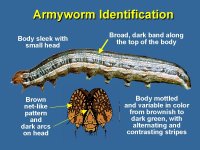Bigfoot62
Veteran Member
- Joined
- Aug 5, 2008
- Messages
- 2,485
- Location
- W. Central Louisiana
- Tractor
- JD 5090M; JD 5085M; JD 5083E; NH TN70A; Ford 2600

Anyone having trouble with Armyworms yet?
Late June, they were in a neighbor's meadow just 1/4 mile away from my place. Last week they ate 20 acres of Alicia that's 1/2 mile away.
So far, I haven't seen any in my Coastal patch. (I have just a few acres of Coastal Bermuda, the rest of mine is Bahaia) But, I have a mower hooked up and I'm ready to cut that 12 acres if I have to. I'd rather wait about another few days and hope the weather improves before I cut it, but I'd rather take a chance on getting it wet than letting the worms eat it.